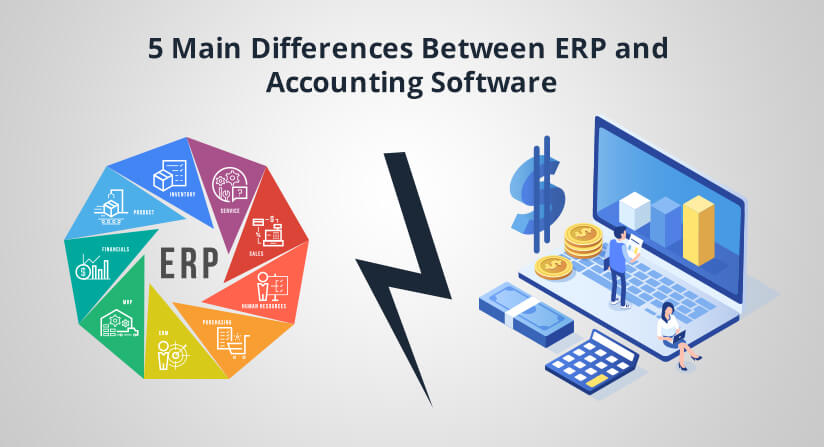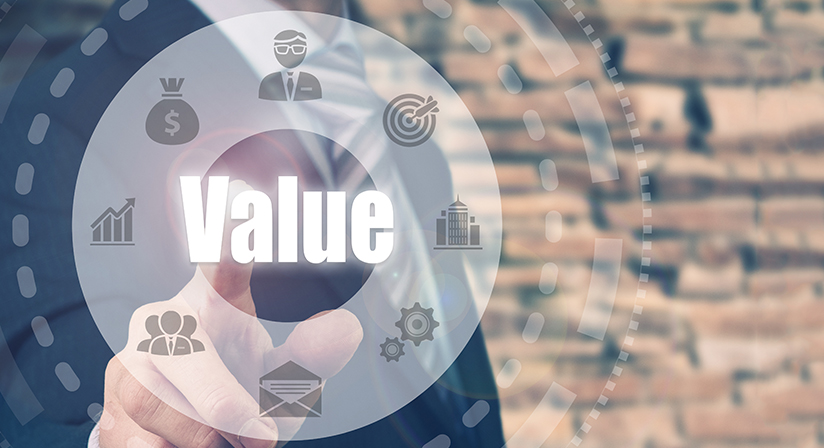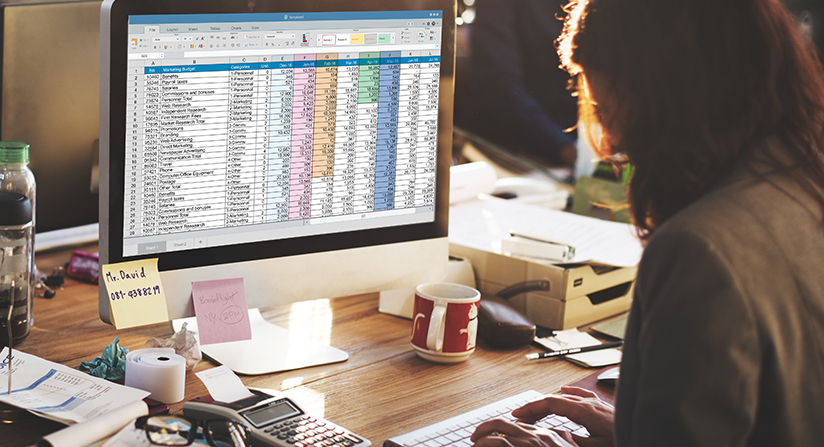Accounting software typically covers the management of areas such as financial reporting, accounts payables and receivables, banking, and recording of basic revenues/sales ERP solutions include multiple modules with accounting being one of them. Other modules include supply chain, planning, inventory management, warehouse management, production, HR, sales, purchasing, and more.
However, many people use the terms “accounting software” and “ERP software” interchangeably. In this blog, we’ll walk you through the differences between accounting software and ERP solutions.
The global ERP market is set to grow to $47 billion by 2021
As research indicates1, an increasingly competitive market compels organizations to adopt ERP solutions to keep pace with their competitors.
As small and midsized manufacturers (and businesses in general) grapple with out of control business processes, caused in part by the disconnect between accounting and plant floor operations, the need for a single view of organizational processes is driving the adoption of ERP solutions. The demand for ERP software is expected to grow rapidly.
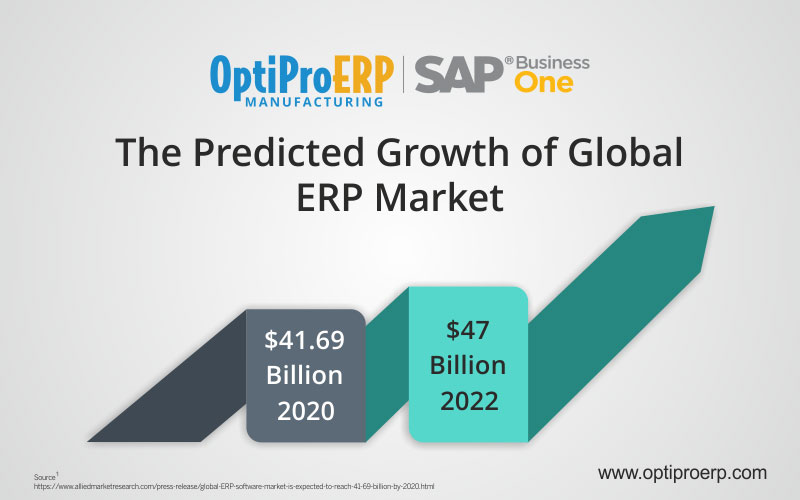
Let’s understand the difference between accounting software and ERP in detail:
As the world grows more complex with faster turn times, customer expectations for product personalization, and more data to manage than ever before, software that supports the operational efficiency of core business processes is essential. Companies also require relevant features that serve the dynamics of industry-specific needs and challenges. This also applies to stand-alone accounting and financial management software as they fulfill only limited needs when compared to an end-to-end ERP solution.
People sometimes erroneously use the terms accounting software and ERP software interchangeably. In reality, accounting and financial reporting software is a subset of an ERP system. It’s important to understand the difference. Let’s take a closer look.
Accounting software, like QuickBooks, is not enough
Almost every business uses accounting and financial management software. So, how is ERP accounting software better than stand-alone accounting software?
Not that long ago, QuickBooks, Sage, and Dynamics GP were undisputed accounting software leaders for small and midsized businesses. As businesses faced stronger competition and their customers expected faster turn times and more customization, the need for ERP software became apparent.
Stand-alone accounting software can take care of the standard accounting functions, banking, and limited reporting. However, the standard accounting packages that small and midsize businesses have used for years, cannot forecast what’s in store for tomorrow.
The accounting and financial management features and capabilities that are inherent in ERP solutions deliver a single source of real-time and fully integrated information across different departments for better decision-making. Real-time visibility across the enterprise provides insight into purchasing, production, inventory movement and warehouse management.
For example, accounting software, such as QuickBooks, cannot scale with your company’s growth because it operates on a proprietary database. Such stand-alone solutions weren’t built to connect company-wide processes and deliver real-time visibility into the status of those processes. As a result, you end up with silos of information that cannot provide a transparent and complete picture of your business operations.
What is an ERP system?
An ERP system combines financial management, supply chain, CRM, and in some cases, industry-specific solutions into one broad system, helping businesses gain full visibility and control, scale, and compete in an increasingly competitive environment.
ERP business software provides a single, comprehensive information system that allows you to accurately process and analyze data across company-wide functions. ERP accounting software streamlines sales and inventory, detects process deficits, and boosts productivity.
So basically, ERP software has the features of accounting software, plus more.
The key driver in selecting an ERP software for accounting is to enhance the overall operational efficiency, scalability and transparency within the business.
Accounting Software vs. ERP Software
There are 5 things you might want to consider when comparing accounting software with ERP.
1. An ERP solution is similar to a collection of Legos
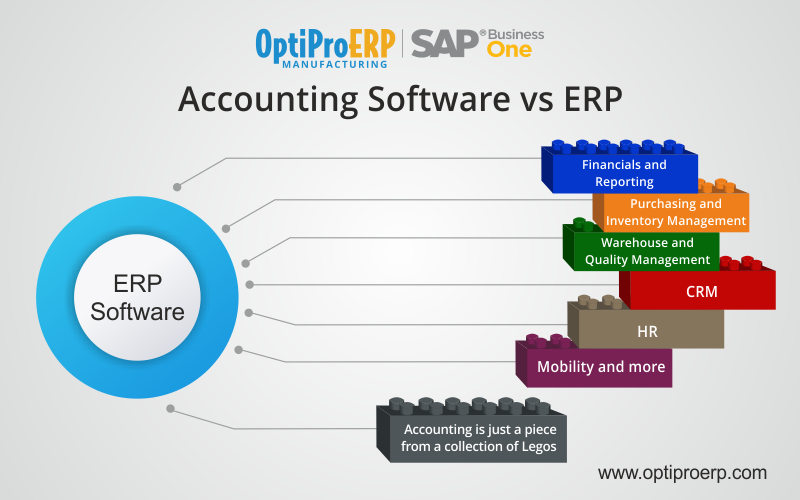
ERP software goes far beyond what accounting software can offer. The accounting and financial management capabilities within an ERP system deliver a 360-degree enterprise-wide view, including features such as Financial Management and Reporting, Sales, Purchasing and Inventory Management, Warehouse and Quality Management, CRM, HR, Mobility, and more.
2. Stand-alone Accounting Software is not built for industry-specific needs
Stand-alone accounting software has a limited capability to track inventory for manufacturing and distribution businesses, relying on unwieldy third-party add-ons. While an ERP solution delivers genuine, feature-rich inventory management tools for manufacturers and distributors. With manufacturing ERP, you can proactively manage inventory to reduce stock carrying costs, make faster and more accurate decisions, and lower labor costs. Even better, ERP solutions seamlessly manage the entire shop floor execution system. An ERP solution also lets you manage BOMs, production planning, supply chain management, production resources, supply shipments, and much more. Whereas, accounting software doesn’t provide manufacturing management capabilities.
3. Accounting Software and ERP solutions are not always GAAP compliant
Many stand-alone accounting and ERP solutions, including some of the popular ones, are not GAAP compliant or make it difficult to comply with GAAP standards – a software flaw that many growing small and midsized companies can’t afford. You should always ask the vendor how their software can help you comply with GAAP standards, tax laws, and financial regulations.
4. Accounting Software does not include sales or customer relationship management
An ERP solution provides sales management and order processing. ERP solutions often have a seamless CRM module that lets you access updated contact information and see the history of previous communications. Whereas, stand-alone accounting software does not have these capabilities.
5. Accounting Software is limited in providing real-time data and mobility
ERP integrates all financial information in a single database. By providing an integrated solution for a wide range of business processes, ERP systems eliminate the need for different tools to manage the requirements of different departments. Furthermore, company-wide data is available in the cloud for anywhere, anytime access to real-time information using a mobile device. ERP systems connect every part of the business so that every decision is based on real-time intelligence.
What’s in store for the future of stand-alone accounting software?
The accounting software package market has suffered some setbacks recently. Leading providers of accounting software, Sage and Iris, were criticized by the IT Usage in Accountancy Practices2 as surveyed by the ICA’s IT Faculty. The faculty found that 24% of accountants had experienced a loss in time and fees due to an accounting software failure. As more businesses demand better integration of their operations, ERP seems to be quickly co-opting the market for accounting software, particularly among growing businesses. As businesses outgrow QuickBooks, they are looking for ERP and accounting software that offers accounting functionality, plus operational functionality to manage diverse business processes. And that makes investing in accounting ERP systems a great choice for your business.
1Source: Allied Market Research,
2Source: ICA IT Faculty
Follow Us

